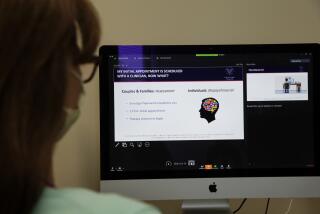Talking Up Talk as Therapy of Choice
- Share via
TORONTO — The 15,000 psychologists attending the annual American Psychological Assn. meeting here departed Tuesday with a major question looming: Is what they do--talk therapy--becoming less relevant in the treatment of mental health disorders?
With the introduction of a dozen or more powerful medications for such widespread illnesses as depression, anxiety and obsessive-compulsive disorder, many psychologists are fearful that consumers and health insurers are losing sight of the advantages offered by psychological therapies, said psychologist Garland Y. DeNelsky of the Cleveland Clinic Foundation.
“The data suggest, despite conventional wisdom, that psychotherapy is the treatment of choice for a wide spectrum of disorders. But it’s amazing how [drug companies] have come to dominate psychiatric thinking,” he said.
Last year, the APA voted to support efforts by their members to secure prescription privileges for psychologists. Several state bills have been introduced, including legislation in California, but none has succeeded thus far. Doctors oppose the movement, and so do many psychologists.
DeNelsky, a leading opponent of prescription privileges, said the change would mark “the extinction of sound psychological interventions. An alarming number of psychologists are already acquiescing to the predominant idea in psychiatry that medications are the treatment of choice, especially when the illness is severe.”
In the era of managed health care, restrictions on counseling are common. Studies show that medical treatments such as drugs are typically reimbursed at 80% of cost; psychotherapy is reimbursed at an average of 50% of cost, DeNelsky said.
More family physicians are treating mental health disorders rather than referring to specialists. Primary care doctors are also much more likely to write a prescription for anxiety or depression.
As part of a nationwide campaign directed to consumers, psychologists are attempting to promote the advantages of psychotherapy over other treatments, such as medication. In contrast to huge pharmaceutical companies, “there is no ‘psychotherapy industry’ relentlessly promoting the benefits of psychotherapy and other psychological and behavioral interventions,” DeNelsky said.
While disorders such as schizophrenia and severe attention deficit hyperactivity disorder clearly benefit greatly from medication, arguments can be made for medication, psychotherapy or a combination of both for many other disorders, APA experts noted.
A major disagreement exists on what works best for depression. As the number of prescriptions for Prozac soars, psychologists clamor to make a case for psychological interventions.
Psychological therapies attempt to uncover the causes of depression, such as negative thought patterns, and eliminate them, said David O. Antonuccio of the University of Nevada. “We teach patients skills and give them hope.”
Added DeNelsky: “People in psychotherapy learn to grow, to cope more effectively and think more rationally.”
*
One reason for the popularity of antidepressants may be scientific advances indicating mental illnesses often have biological underpinnings. But psychotherapy is still effective, Antonuccio said.
And patients taking antidepressants or anti-anxiety medications are more likely to relapse after going off the treatment, said William Danton of the Veterans Affairs Medical Center in Reno. “Some patients do enjoy the relief they get from drugs. But do the drugs cure [the disorder] or provide a temporary escape from it?”
So sweeping is the enthusiasm for medications that depressed children are increasingly being given antidepressants, Antonuccio said, despite the fact that “there is no evidence that they are effective or safe in children.”
More studies are needed to clarify which treatments work best for particular patients, the experts agreed. But if psychologists earn the right to prescribe medication, there may be less incentive to try to prove the effectiveness of psychological treatments, DeNelsky warned. “Prescription privileges could transform psychology to a field similar to psychiatry.”






